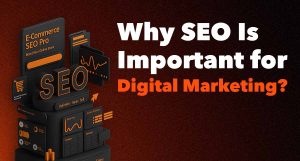In the rapidly evolving digital landscape, marketing strategies must evolve to keep pace with changes in consumer behavior, technology, and competition. Data-driven marketing (DDM) has emerged as one of the most important approaches for businesses to stay competitive and relevant in 2025. By leveraging data, businesses can make informed decisions, personalize their messaging, improve customer experiences, and ultimately drive better results from their marketing campaigns.
In this blog, we will explore why data-driven marketing is critical in 2025, how analytics plays a central role, the benefits it provides, and how businesses can overcome challenges when implementing this strategy.
Consumers today expect personalized experiences. They want to feel like brands understand their unique needs and preferences. In 2025, personalization at scale will be a major driver of marketing success. With data, businesses can deliver tailored experiences that resonate with individual customers, even on a mass scale.
Personalization involves delivering content, offers, and products based on an individual's past behavior, preferences, and interactions with your brand. By using data to segment your audience and create personalized messaging, you increase the likelihood of conversions, repeat business, and customer loyalty.

Why Data-Driven Marketing is Essential in 2025
As businesses increasingly rely on digital channels to connect with consumers, data has become the most valuable asset in shaping marketing strategies. The ability to harness large volumes of data and transform it into actionable insights is what sets successful marketing campaigns apart from those that fail. In 2025, this ability will be even more important.The Growing Importance of Data in Marketing Strategies
In 2025, data is not just an optional tool for marketers; it is a necessity. With vast amounts of customer information available, businesses now have the opportunity to personalize their marketing efforts like never before. From tracking consumer behavior to understanding purchasing patterns, the insights that data provides enable businesses to create more targeted, relevant, and timely campaigns. Data-driven marketing enables marketers to:- Understand customer preferences: Knowing what customers want, when they want it, and how they prefer to engage with your brand is crucial for delivering meaningful interactions.
- Monitor consumer behavior: By analyzing data, marketers can understand how consumers behave across different touchpoints, allowing them to refine campaigns and messages in real-time.
- Predict trends: With predictive analytics, businesses can anticipate future consumer trends, making it easier to stay ahead of the competition. read more, how to optimize campaigns with analytics
 Personalization at Scale
Personalization at Scale
Consumers today expect personalized experiences. They want to feel like brands understand their unique needs and preferences. In 2025, personalization at scale will be a major driver of marketing success. With data, businesses can deliver tailored experiences that resonate with individual customers, even on a mass scale.
Personalization involves delivering content, offers, and products based on an individual's past behavior, preferences, and interactions with your brand. By using data to segment your audience and create personalized messaging, you increase the likelihood of conversions, repeat business, and customer loyalty.
Improved Customer Experience and Engagement
Data-driven marketing provides businesses with the tools to enhance the customer experience. By understanding customer behavior and preferences, brands can provide more relevant content, offers, and communication. When customers receive messages that resonate with them, they are more likely to engage with the brand. In 2025, the importance of customer experience (CX) will continue to rise, and data will be the driving force behind delivering exceptional CX. Marketers will be able to engage with customers on multiple platforms, track their interactions, and refine messaging in real-time, creating a seamless and personalized experience.The Role of Analytics in Data-Driven Marketing
Analytics lies at the heart of data-driven marketing. Without the ability to gather and analyze data, marketers would be flying blind, making decisions based on assumptions rather than facts. The role of analytics is to convert raw data into actionable insights that can optimize marketing strategies and improve performance.Actionable Insights from Analytics
One of the key advantages of analytics in data-driven marketing is the ability to extract actionable insights. Analytics tools allow businesses to track key metrics such as customer behavior, conversion rates, engagement levels, and return on investment (ROI). These insights provide a clear picture of what is working and what is not. For example, if a campaign isn't performing well, analytics can help pinpoint the problem, whether it's an issue with targeting, content, timing, or budget allocation. By acting on these insights, marketers can make adjustments in real-time to optimize their campaigns for better results.Measuring ROI and Campaign Effectiveness
In 2025, measuring ROI will be more important than ever. Businesses are under pressure to demonstrate the effectiveness of their marketing spend. Analytics provide the tools necessary to measure the success of campaigns in terms of revenue generated, customer acquisition, and brand awareness. By tracking the ROI of your marketing efforts, you can allocate resources more effectively and ensure that your campaigns are delivering value. This data helps marketers focus their budget on high-performing channels and strategies, improving overall efficiency. read more, benefits of digital marketingA/B Testing and Optimization
A/B testing is one of the most powerful tools available in data-driven marketing. It allows marketers to test two versions of an asset (such as an ad, email, or landing page) to see which one performs better. A/B testing provides valuable insights into what resonates with your audience and helps optimize your campaigns accordingly. In 2025, A/B testing will continue to be a critical part of marketing strategies. With the help of analytics tools, businesses can test multiple variations of their campaigns in real-time, fine-tuning their messaging, offers, and creative to maximize performance.Benefits of Data-Driven Marketing
Data-driven marketing offers numerous advantages for businesses that choose to embrace it. The ability to make decisions based on data allows companies to stay competitive, reduce waste, and increase the effectiveness of their campaigns.Enhanced Decision-Making with Data Insights
Data-driven marketing empowers businesses to make more informed, strategic decisions. Instead of relying on guesswork or intuition, marketers can use data insights to understand customer preferences, identify trends, and allocate resources more efficiently. With this approach, businesses can avoid costly mistakes and focus on tactics that yield the best results.Greater Efficiency and Cost-Effectiveness
Using data to guide your marketing efforts leads to greater efficiency. By tracking performance and identifying high-performing strategies, businesses can eliminate underperforming campaigns and focus on those that generate the best return. This results in cost savings and ensures that every marketing dollar is being spent wisely. For example, by analyzing campaign performance, you can identify which channels are driving the most traffic and conversions, allowing you to optimize your marketing budget accordingly. This approach reduces unnecessary spending and maximizes the impact of your campaigns.Competitive Advantage and Market Differentiation
In today’s highly competitive market, businesses that leverage data effectively have a significant advantage. By using data to understand customer needs and preferences, businesses can offer more relevant, personalized experiences that set them apart from competitors. Data-driven marketing also allows businesses to identify gaps in the market and create products, services, or campaigns that directly address those gaps. This ability to differentiate your brand based on customer insights is a key factor in gaining a competitive edge.
Overcoming Challenges in Data-Driven Marketing
While data-driven marketing offers numerous benefits, it also comes with its own set of challenges. Businesses must navigate issues like data privacy concerns and integrating data across multiple platforms to fully realize the potential of this approach.Data Privacy and Security Concerns
As more data is collected, businesses face increasing concerns about data privacy and security. Consumers are becoming more aware of how their data is being used, and businesses must be transparent and responsible in handling this information. Failing to comply with privacy regulations such as GDPR can lead to hefty fines and damage to your reputation. To overcome this challenge, businesses must prioritize data security, implement encryption and secure payment methods, and ensure compliance with relevant regulations. It’s also essential to be transparent with customers about how their data is being used and give them control over their information.Integration of Data Across Platforms
Many businesses struggle with integrating data from different sources, such as social media platforms, email marketing tools, and website analytics. Without proper integration, data becomes fragmented, making it difficult to get a clear picture of campaign performance. To address this issue, businesses should invest in tools that allow for seamless integration across platforms. Platforms like Google Analytics and CRM systems can consolidate data from various sources, providing a more unified view of your marketing efforts. Conclusion Data-driven marketing is no longer a luxury, it's a necessity for businesses in 2025. By leveraging data to make informed decisions, personalize marketing efforts, and optimize campaigns, businesses can achieve greater efficiency, higher ROI, and improved customer experiences. Despite the challenges, the benefits of data-driven marketing far outweigh the obstacles. Businesses that embrace this approach will not only stay competitive but will also be able to differentiate themselves in an increasingly crowded marketplace. By using analytics tools, A/B testing, and leveraging insights, businesses can build stronger, more effective marketing campaigns that drive growth and engagement. FAQ- How can I start using data-driven marketing? Begin by collecting data from various sources, such as website analytics, customer feedback, and social media insights. Use this data to personalize your marketing efforts, test different strategies, and continuously optimize your campaigns.
- What tools are best for data-driven marketing? Google Analytics, social media analytics platforms (e.g., Facebook Insights, Instagram Analytics), and email marketing tools like Mailchimp are all excellent options. These tools help track performance, measure ROI, and optimize campaigns.
- How does data-driven marketing improve customer experience? By analyzing customer data, businesses can deliver more personalized content, offers, and experiences that resonate with their audience, improving satisfaction and engagement.
- What is the biggest challenge in data-driven marketing? The biggest challenge is ensuring data privacy and security, as well as effectively integrating data from different platforms to get a unified view of campaign performance.




